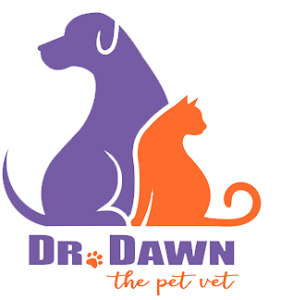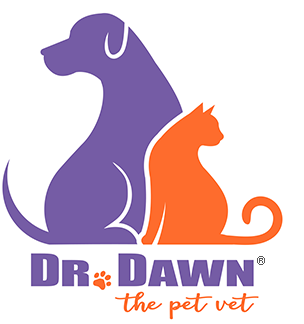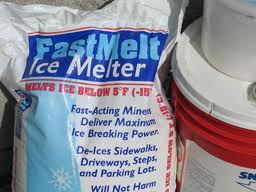Here are some tips for keeping your pets out of danger during the holiday and winter season. Many are from the ASPCA Poison Control Center.
We have already discussed problem foods, but don’t forget about Alcoholic beverages, which are bad for your pets. Also, tobacco products, including cigars, and if ingested, can be lethal to dogs and cats, depending on the dose.
PLANTS:
Lilies that may be found in holiday flower arrangements could be deadly to your cat. Many types of lily, such as Tiger, Asian, Japanese Show, Easter, Stargazer, and the Casa Blance, can cause kidney failure in cats.
Pointsettias are generally over-rated in toxicity, yet should still be avoided, or at least monitored. If eaten, can be irritating to the mouth and stomach, and may result in mild vomiting or nausea.
 Mistletoe has the potential to cause heart problems. However, ingestion more typically causes gastrointestinal upset.
Mistletoe has the potential to cause heart problems. However, ingestion more typically causes gastrointestinal upset.
Holly ingestion could cause vomiting, nausea, diarrhea, and lethargy.
HAZARDS AROUND THE CHRISTMAS TREE
 Christmas tree water may contain fertilizers, which, if ingested, can cause stomach upset. Stagnant tree water can be breeding grounds for bacteria, which can also lead to vomiting, nausea, and diarrhea, if ingested.
Christmas tree water may contain fertilizers, which, if ingested, can cause stomach upset. Stagnant tree water can be breeding grounds for bacteria, which can also lead to vomiting, nausea, and diarrhea, if ingested.
Electric cords Avoid animal exposure to electric cords. If they are chewed, they may electrocute your pet, or at least burn their mouths. Cover up or hide them.
 Ribbons or tinsel can get caught up in the intestines and cause intestinal obstruction.
Ribbons or tinsel can get caught up in the intestines and cause intestinal obstruction.
Batteries contain corrosives. If eaten they can cause ulceration to the mouth, tongue, and the rest of the gastrointestinal tract.
Glass ornaments can cut the tissues of the gastrointestinal tract if eaten. Makes sense!
Potpourris are popular household fragrances during the holiday season. Pets are often exposed to liquid potpourri by direct ingestion from simmer pots or spills, or rubbing against leaky bottles or spilled contents onto themselves.Oral exposures result following grooming. Some types of liquid potpourris can result in severe oral, skin and eye damage. Dry potpourri generally doesn’t cause issues, other than problems that might result if a large amount eaten can cause an obstruction, or possibly toxicity, depending on the type of plant in the mix.
MEDICATIONS
Keep all prescriptions and over-the-counter drugs out of the reach of your pets. Preferably in closed cabinets, as many pets climb. I have discussed this in detail before, but common examples include pain killers, cold medicines, anti-cancer drugs, antidepressants, vitamins, and diet pills. They can be potentially lethal, even in small dosages.
One regular strength ibuprofen tablet (200 mg) can cause stomach ulcers in a 10 pound dog. Remind guests of this as well. Never give your animal any medications unless under the directions of a veterinarian. This happens more often during the holidays, as many veterinary clinics have limited office hours this time of year.Less than one regular strength acetaminophen tablet (325 mg) can be dangerous to a cat weighing 7 lbs.
OTHER WINTER HAZARDS
Antifreeze has a pleasant, sweet taste. Very small amounts can be lethal. As little as one teaspoon of antifreeze can be deadly to a cat. Less than four teaspoons can be dangerous to a 10 pound dog. Thoroughly clean spills, store in tightly closed containers. Consider Low Tox brands safer for pets, which in propylene glycol form. Gasoline and oil should also be stored safely away from pets.
If you think your pet has consumed antifreeze, contact your veterinarian or the ASPCA Animal Poison Control Center 91-888-4-ANI-HELP) right away!
 Ice melting products can be irritating to the skin and mouth. Depending on the actual ingredient, and quantity, signs of ingestion you might see include excessive drooling, depression, vomiting or other blood abnormalities.
Ice melting products can be irritating to the skin and mouth. Depending on the actual ingredient, and quantity, signs of ingestion you might see include excessive drooling, depression, vomiting or other blood abnormalities.
Rat and mouse killers are used more commonly during colder weather. Place the baits in areas inaccessible to your pets. If you have a service that places baits, find out the poison name they use and save the info for your vet should there ever be an accidental ingestion.
Dr. Dawn
Please share and subscribe here




